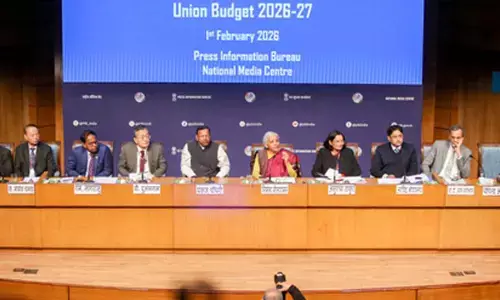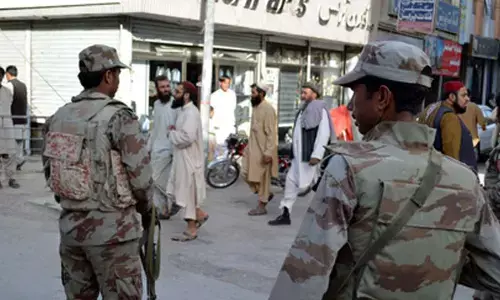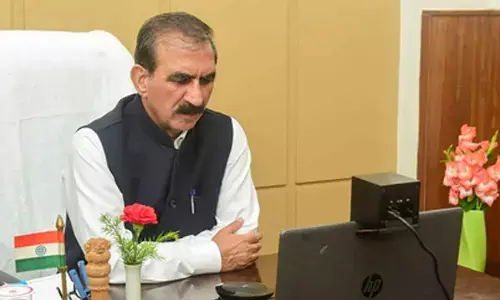Indian banks resilient, but far from being foolproof inclusive

A robust banking system serves as the cornerstone of financial stability and fosters economic growth
India rightly boasts of having one of the largest banking networks in the world. However, in hindsight, our banks are far from being foolproof and inclusive.
Over the years, banks in public and private sectors have improved their functioning by several notches but stark glitches remain. The advent of path-breaking initiatives like Digital India and Direct Benefit Transfer (DBT) scheme have resulted in a manifold increase in the number of account holders, thereby boosting the idea of financial inclusion as being perceived and conceptualized by policy makers and implemented by the government. It is indeed an encouraging situation.
Academically speaking, banks and a broader banking system play a crucial role in modern economies, serving as the cornerstone of financial stability and facilitating economic growth. They provide essential services that support individuals, businesses, and governments in managing their finances and investments.
Through the provision of various financial products such as savings accounts, loans, and investment opportunities, banks enable individuals and businesses to save, invest, and access credit, thus fostering entrepreneurship and fuelling economic development. Moreover, banks serve as intermediaries, connecting those with surplus funds to those in need of capital, thereby promoting efficient capital allocation and fostering a healthy financial ecosystem. Banks contribute significantly to the stability of the financial system by regulating the flow of money, managing risks, and providing a secure platform for transactions, thereby instilling confidence in the economy. Overall, the importance of banks and banking lies in their ability to foster economic growth, provide financial stability, and facilitate the efficient allocation of resources in an ever-evolving global financial landscape.
Unfortunately, our banks are not reaching out to the masses in general and the needy in particular about their various facilities, services and products. Accepting deposits and disbursing money in the form of credits or loans are certainly fine but our banks should have a target to extend financial assistance to the needy in general and seekers of higher education in particular. For reasons known to them, our banks rarely go to poor students with multiple educational loan options and how they can avail themselves of these products to further their career. They certainly entertain them if they approach them in a branch and that too when the concerned bank officials are convinced about the paying capacity of borrowers. Otherwise, they will not facilitate them. Of course, they will not say ‘no’ but they know well how to ensure loans don’t reach them.
As a result, students, entrepreneurs, startups and self-help groups (SHGs) from weaker sections of society such as OBCs, SCs and STs do not have a significant share in educational and entrepreneurial loans of our banks. So, banks must go the extra mile and help them. By providing financial services, banks will not only empower marginalized and underserved communities but will also accelerate the pace of financial inclusion. By extending credit to small businesses and entrepreneurs, particularly those from disadvantaged backgrounds, banks can contribute to creating opportunities for economic advancement and reducing socioeconomic disparities. By facilitating the distribution of government welfare and assistance programs, they ensure that vulnerable populations have access to essential financial resources, thereby promoting social equity and enabling a more inclusive and equitable society. This spirit needs to be further strengthened.
Our banks also need to work hard to bridge gaps and check frauds. They need to learn fast from past mistakes, lapses and scams so that these are not repeated. As reported widely in the media, in 2015, foreign exchange remittance scam of Rs. 6,000 crore was unearthed in Bank of Baroda. Six years later, the CBI arrested six people in this regard.
In September this year, the CBI registered a Rs. 975-crore bank fraud case against Mumbai-based Mandhana Industries, now GB Global Limited, and its promoters. The case had been filed for allegedly defrauding a consortium led by Bank of Baroda (BoB). As per media reports, former Managing Director, Purushottam Chhaganlal Mandhana, former Executive Director Manish Biharilal Mandhana, and a few others have been named by the CBI.
In April 2018, the CBI reportedly questioned six former senior officials of Bank of Baroda, including its former CMD M.D. Mallya in connection with the Rs. 2,919-crore alleged loan fraud by Rotomac. This July, CBI arrested Jag Mohan Garg, CMD of Tirupati Infraprojects Pvt Ltd in a bank fraud case involving an amount of Rs. 289.15 crore. Indian banks reported Rs. 4.69 lakh crore losses on account of frauds between June 1, 2014, and March 31, 2023, from around 65017 frauds reported across banks, the RBI said in response to a RTI query filed by one Ajay Basudev Bose on June 6, 2023.
The number of frauds in the banking sector went up to 13,530 in 2022-23 year-on-year, but the amount involved nearly halved at Rs. 30,252 crore, as per RBI data. Around 9,097 frauds had taken place in 2021-22 involving Rs. 59,819 crore. In 2020-21, the number of frauds was 7,338 and the amount involved was Rs. 1,32,389 crore. The RBI has reiterated its resolve to take more steps to check fraud in the banking sector. So, one should remain hopeful.
In response to another RTI query filed by a prominent English daily, RBI revealed that banks wrote off bad loans worth over Rs. 2.09 lakh crore during the year ended March 2023, bringing the total loan write-offs to a staggering Rs. 10.57 lakh crore in the last five years, as reported by the newspaper. During the fiscal ending March 2023, loan write-offs by banks rose to Rs. 209,144 crore, as against Rs. 174,966 crore a year ago and Rs. 202,781 crore in March 2021.
Similarly, our banks need to devise an effective mechanism to ensure that the unclaimed money reaches their rightful depositors. According to a recent statement made in the Parliament, public sector banks have transferred unclaimed deposits to the tune of Rs. 35,000 crore to RBI this February-end. These deposits, which had been inactive for 10 years or more, were associated with 10.24 crore. If a bank account remains inactive for 10 years, the money gets transferred to the RBI’s Depositor Education and Awareness (DEA) Fund every month. So, in totality, our banks have to raise their quality benchmarks in order to ensure total guarantee to people’s money.














